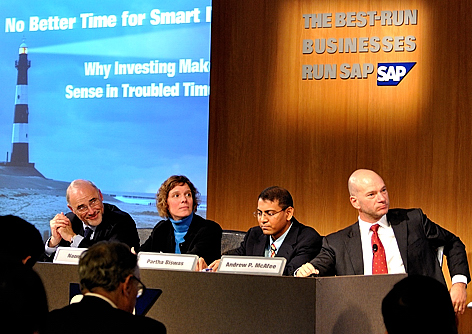SAP: Pushing against the economy


SAP's Co-CEO, Leo Apotheker, hosted a panel discussion this past Friday afternoon, exploring reasons to maintain IT investment during difficult economic times.
The well-rounded panel included:
- Leo Apotheker Co-CEO of SAP
- Naomi Wyatt, secretary of administration for the Commonwealth of Pennsylvania, and an SAP large public sector customer
- Partha Biswas, CIO of Joerns Healthcare, and an SAP customer representing the SMB market
- Andrew McAfee, Harvard Business School professor who coined the phrase "Enterprise 2.0"
- Bruce Richardson, Chief Research Office from AMR Research, who moderated the event
Companies struggling with top line revenue must create efficiency, using technology to change processes, and then innovate.
Andrew added, "SAP builds and offers 'process factories' for a living. It provides the infrastructure for good ideas that you can employ, and then innovate on top of that."
Both SAP customers emphasized their implementations went smoothly, as Larry Dignan reported:
SAP’s customers on the panel all had success stories to tell, but the general theme was that they were able to implement quickly. That’s a big message if you’re going to get folks to invest in a recession.
From an economic perspective, SAP presented specific reasons companies should invest in the software maker's technology and products:
- SAP's enhancement pack strategy reduces implementation time and TCO, allowing the customer greater control over in-place upgrades
- Currently financing packages ease cash requirements for SMB companies purchasing SAP software
One member of the audience asked a question regarding software license discounting, to which Leo jokingly responded, "Discounting has been part of the software industry since the second day it existed. The first day no one knew what software was."
THE PROJECT FAILURES ANALYSIS
SAP is at a crossroads in at least two areas:
- Tough economic conditions have hit the company hard, as many potential customers slow their expenditures on large IT projects
- Software as a service is rapidly becoming an important consideration for many technology buyers; with lower margins than on-premise software, this trend pressures downstream SAP profitability and potentially even market share.
Regarding the first point, SAP is doing exactly as every business must: pushing economic incentives while doing everything possible to stay on customers' radar.
The company is also bringing out customers who have experienced smooth or rapid implementations to discuss their experiences. This message is critically important during economic periods when ROI on technology investments is all-important. Problematic implementations can wreak havoc on a project's expected ROI, so rapid implementations are truly a big deal. From a project failures perspective, this is an important point on which to focus.
At the same time, some observers, such as Vinnie Mirchandani and Dennis Howlett, have referred to recent SAP price hikes in support and maintenance as "empty calories." In effect, license incentives bring in new customers while high maintenance fees keep them profitable for SAP. This practice has become overly common in the enterprise software industry as a whole.
The software as a service threat is a longer-term challenge, although SAP disagrees with that perspective. Larry Dignan quoted Leo:
What we can do is to combine the two worlds, there are certain things you can’t run in the cloud because it can collapse. No consumer company is going to run billing for 50 million customers in the cloud. It doesn’t make sense. We’re giving people the opportunity to run the two things together. Try to give everyone a choice. People will do what they always do. They’ll do return on capital and what makes more sense.”
Leo added, "It's arrogant to dictate to customers. Better to ask them and respond to what they need."
Prashanth Rai interpreted the company's SaaS conundrum this way:
SAP doesn't want to hurt/ kill its golden goose (Large Enterprise Business) and mess with their financials in a negative manner (particularly given the economic conditions)....
Asked by an audience member to predict the extent of the overall economic downturn, Leo said, "I'm not a prophet and I don't know how bad it's going to be. There's a real storm out there and it's pretty bad."
The panel discussion is part of SAP's ongoing effort to ride out this macro-economic storm.
[Photos by Michael Krigsman. Disclosure: SAP paid my travel expenses to New York to attend the event.]